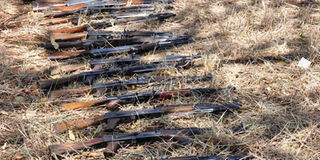Prime
Karamoja leaders demand fresh disarmament exercise

Operation. Some of the guns that the army recovered during a disarmament exercise in Karamoja in 2017. PHOTO BY STEVEN ARIONG
Leaders in Karamoja Sub-region have called for a fresh disarmament exercise to remove all guns that are being used by cattle rustlers to destabilise the area.
The call follows recurring cattle raids between the Matheniko of Moroto, Jie of Kotido, Dodoth of Kaabong, Bokora of Napak and Pokot of Amudat, and Pian of Nakapiripirit and Nabilatuk districts.
Mr John Baptist Lokii, the Member of Parliament for Matheniko County, said the recurring cattle raids are a sign that there is ongoing rearmament and presence of illegal arms.
“We call upon government to launch another serious phase of re-disarmament in Karamoja. We are investigating the source of guns being used by the rustlers to wreak havoc,” he said.
Mr Francis Kiyonga, the Amudat District chairperson, said government has been silent on calls for another disarmament exercise. “Although the army is still carrying out the disarmament, our intelligence so far gathered calls for the urgent need to collect the guns,” he said.
Between 2001 and 2002, government disarmed Karimojong of firearms used in raiding cattle from the neigbouring regions such as Teso. The army managed to collect about 50,000 guns.
Karimojong had enjoyed some relative peace until October last year when armed Karimojong resumed laying road ambushes and raiding animals. The raids have now intensified, with warriors clashing with UPDF soldiers on a weekly basis.
Mr Mark Abuku, the Kaabong District chairperson, said the situation is worsened by the porous border.
The sub-region also neighbours other armed pastoralists communities such as the Turkana and the Pokot in Kenya, and the Dinka and Topotha in South Sudan.
Appeal
Mr Samson Lokeris, the Member of Parliament for Dodoth East in Kaabong who also doubles as chairperson Karamoja Parliamentary Group, said they have written several letters to the chief of defence forces, seeking a disarmament exercise but are yet to get a response.
Major Telesphar Turyamumanya, the UPDF 3rd Division commander, said the army is in charge of the security situation in Karamoja.
“If the leaders are crying for a disarmament to be re-launched, UPDF is under command and there are steps to be followed. Otherwise we are on the ground collecting guns and if we know where many guns are, we shall go for them,” he said.
After the disarmament exercise, President Museveni ordered for the recruitment of the disarmed Karimojong to be trained as Local Defence Unit personnel where they were paid monthly salaries to help the army trace the remaining warriors who had refused to hand over their guns.
Growth index
Poverty. The proportion of Karimojong trapped in chronic poverty is at 24 per cent, twice higher more the national average of 10 per cent, according to the Uganda National Household Survey 2016/17.
Literacy. The overall literacy rate for Karamoja stands at only 25 per cent, compared to 94 per cent in Kampala, while 60 per cent of women in the sub-region are unable to read and write. Eighty six per cent of the young population in Karamoja have never been to school.



